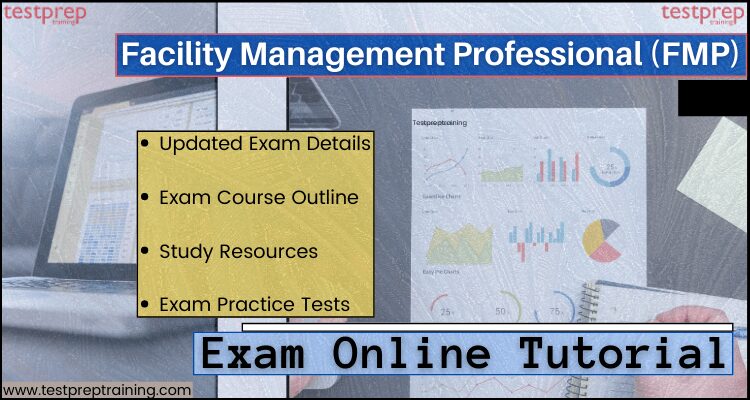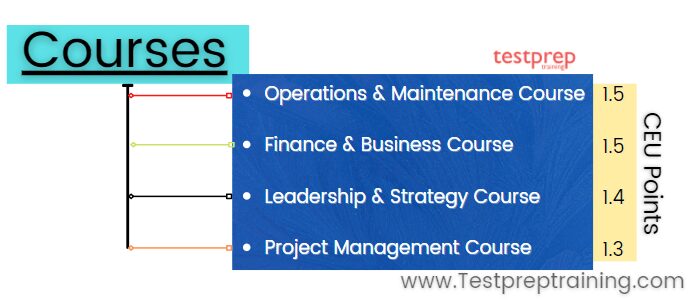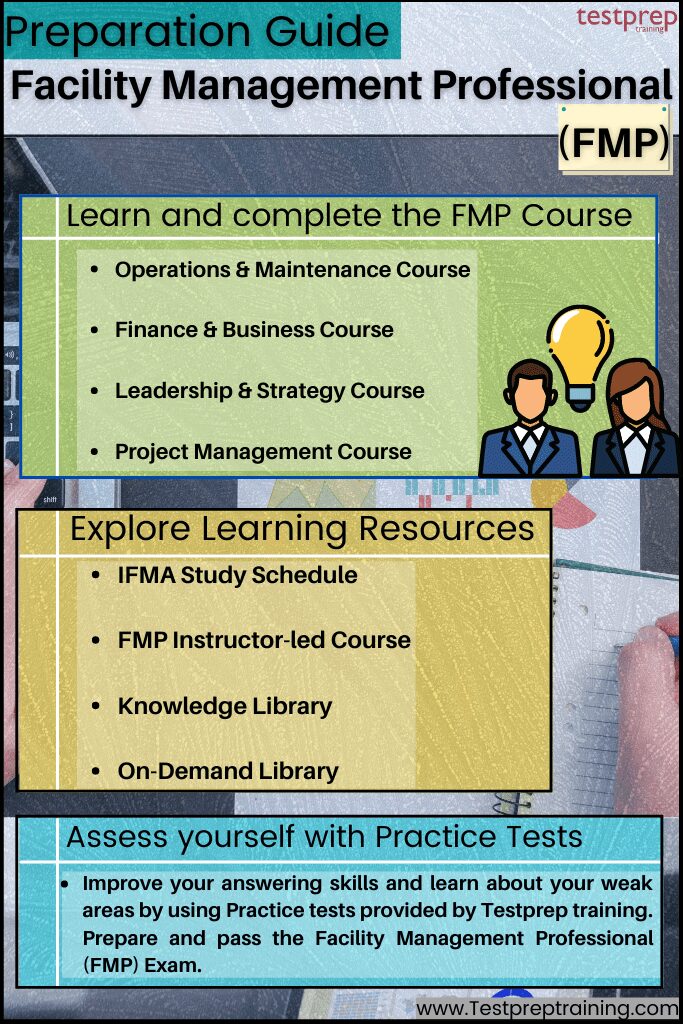Facility Management Professional (FMP)

The IFMA Facility Management Professional (FMP) is a knowledge-based certification developed for all FM professionals and industry suppliers who want to improve their understanding of fundamental FM topics. After receiving the FMP certificate, you’ll be able to join a global community of over 10,000 professionals who have improved their knowledge, abilities, and credibility.
Furthermore, with Facility Management Professional (FMP) certification from IFMA, you will be able to gain the knowledge and skills needed to establish a strong foundation in FM principles. However, using IFMA’s online set of resources, at the end of your training you can expect to:
- Firstly, learn best practices and run facilities more effectively.
- Secondly, establish self-assurance in your function as a facility manager with in-demand abilities. Employers will be impressed by your superior abilities and knowledge.
- Thirdly, improve critical thinking skills, which are necessary for managing complex infrastructures.
- Then, with the help of training, manage your facilities more successfully and efficiently.
- Lastly, establish the abilities and credibility that will enable you to advance to the next level in your profession.
Facility Management Professional FMP Certification Cost:
- For Members: $1,550 USD
- For Non-Members: $1,850 USD
How to get FMP certification? Check below!
FMP Exam Path
The FMP Credential Path consists of:
Prerequisites
- Firstly, Familiarity with FMP Starting Guide
- Secondly, Knowledge of FM
Courses Required
- Firstly, IFMA’s Operations & Maintenance Course
- Secondly, IFMA’s Finance & Business Course
- IFMA’s Leadership & Strategy Course
- Lastly, IFMA’s Project Management Course
You should be aware that the Credential Path keeps track of your progress across all four courses. The route will notify you if you are eligible to apply for the FMP after you have completed all four needed courses.
Understanding the FMP Courses

1. Finance and Business Course
Facility managers control the aspects of the demand organization that represent a significant financial investment in technology, buildings, structures, interiors, exteriors, and grounds. They handle the operation and maintenance of the buildings and grounds including the service contracts. However, the demand organization may choose to contract for services. Further, the Finance and business in FM involve:
- Firstly, the administration of the financial management of the FM organization
- Secondly, procurement
- Lastly, finances linked with contracts

Learning Objectives:
In this candidates will have ability to:
- Firstly, describe the foundational principles of managing finance and business in the facility organization.
- Secondly, manage the daily financial aspects of the facility organization by understanding the key budgeting elements.
- Thirdly, identify the fundamental cost concepts, cost containment opportunities, and the use of chargebacks in facility management.
- Fourthly, develop business cases that are supported by relevant documentation and financial data.
- Lastly, execute procurement and chargeback procedures for the facility organization. And, managing and overseeing contracts within the FM organization.
Course Structure:
This course consists of the following chapters:
- Firstly, Finance and Business in the Facility Organization
- Financial Management of the Facility Organization
- Thirdly, Fundamental Cost Concepts, Containment Strategies as well as the Chargeback in the Facility Organization
- Business Cases, Supporting Documentation, and Financial Reports
- After that, Procurement in the Facility Organization
- Contracts in the Facility Organization
2. Leadership and Strategy Course
Leadership and strategy refers to the tool sets that facility managers can use as appropriate to augment all FM activities. However, these activities include project management, operations and maintenance and finance and business. Facility managers provides two leadership roles:
- Firstly, they lead the FM organization by providing guidance to staff and service providers.
- Secondly, they influence the decisions and attitudes of the organization’s leaders, occupants, government officials, and business partners.
However, to be effective in both roles, facility managers must develop strategies for successfully carrying out major initiatives and influence the decisions and attitudes of others.

Learning Objectives:
In this candidates will gain skills to:
- Firstly, apply the appropriate tools and requirements for completing the inputs, processes, and outputs to create a strategic plan.
- Secondly, apply leadership theories, change management, and communication planning to the FM role.
- Thirdly, apply leadership best practices when managing people within the FM organization.
- Lastly, manage compliance with organizational policies and procedures through facility management leadership.
Course Structure:
This course consists of the following chapters:
- Planning Strategically
- Leading the FM Organization
- Managing the FM Organization
- Influencing the Demand Organization
3. Operations and Maintenance Course
The primary role of facility managers is to manage and control operating facilities. For this, the facility managers must have practical knowledge about building systems, structure, interiors and exteriors. In addition, the various aspects of operations and maintenance (O&M) are changing because of:
- Firstly, wear
- Secondly, new regulations or requirements
- Thirdly, operational modifications
- Next, occupant expectations
- Lastly, many other individual but interrelated circumstances.

Learning Objectives:
In this candidates will learn to:
- Firstly, identify the role of operations and maintenance in FM.
- Secondly, identify deficiencies in building structures, exteriors, systems, interiors, and grounds and the associated health, safety, security and environmental considerations.
- Thirdly, describe the elements associated with the acquisition, installation, maintenance, operation, and replacement of assets related to facility management.
- Then, outline the process for determining and monitoring occupant service performance expectations.
- Lastly, outline the processes for developing occupant service specifications, selecting service providers, negotiating service level agreements, monitoring performance, and resolving contract disputes
Course Structure
This course consists of the following chapters:
- Introduction to Operations and Maintenance
- Assessing and Inspecting Facility Needs
- Managing, Overseeing, and Monitoring O&M of Building, Systems, and Equipment
- Managing, Overseeing, and Monitoring Occupant Services
4. Project Management Course
Facility managers have an important role in all aspects of project management beginning with planning, scoping, scheduling and evaluating. Moreover, project planning and management are considered as core skills in FM. The skills are particularly important but, projects vary in scope, complexity, duration and financial risk. However, a facility manager’s role may change depending on the specifics of the project and his or her capabilities and availability.

Learning Objectives:
After completing the course candidates will have skills to:
- Firstly, explain the common projects in facility management, the role of the facility manager and project manager in projects, and the different project management processes and models.
- Secondly, describe the inputs, processes, and outputs related to:
- Firstly, the Initiate phase of a project.
- Secondly, the Plan phase of a project.
- Thirdly, acquiring a team and resources and executing and controlling a project.
- Lastly, accepting deliverables, closing contracts and the project, and evaluating outcomes.
Course Structure
This course consists of the following chapters:
- Introduction to Project Management
- Initiate Projects
- Plan Projects
- Execute, Monitor, and Control Projects
- Close Projects
For More: Check Facility Management Professional (FMP) FAQs
Managing Credentials
IFMA’s Credentials Application/Maintenance Program (CAMP) gives access to apply, complete, and maintain all the credentials and related information Using CAMP candidates can:
- Firstly, submit and review IFMA credential applications
- Secondly, review credential status
- Thirdly, maintain and submit CFM Maintenance Points
- Fourthly, review credentials and exam history
- Then, download credential logos
- Next, print transcript of CEUs earned through IFMA
- Lastly, make credential payments, review payment history and print receipts
Study Guide: Facility Management Professional (FMP) Certification Exam

1. Getting Familiar with Exam FMP Exam Courses
FMP exam classes are offered by IFMA to assist students in grasping exam subjects. Furthermore, each course includes learning objectives that will assist in the design of skills and knowledge. The Facility Management Professional (FMP) certification test requires these courses as a prerequisite. The following topics are covered in the course:
- Firstly, Operations & Maintenance Course
- Secondly, Finance & Business Course
- Thirdly, Leadership & Strategy Course
- Lastly, Project Management Course
2. IFMA Study Schedule
IFMA prepared a sample study schedule by utilizing the tools and resources available for completing the credential within 4, 8, or 12 months. This study schedule will serve as a guide for achieving your credential based on your preferred timeline. However, this will:
- Firstly, set a firm schedule of days dedicated to studying by blocking out hours free from outside interruptions.
- Secondly, check the material and complete a quiz. And, review the materials missed on the quiz and take notes.
- Thirdly, after you’ve started a module, make it your priority to finish it before moving on to the next.
- Lastly, give yourself three chances to pass your final exam. Spend enough time reviewing the chapters with the most missed questions before taking the third attempt. If you fail your third try, you will be unable to retake the final assessment for a period of 30 days.
Further, each course of the FMP contains the following:
- Firstly, access to interactive online study tools
- Secondly, pre-tests, chapter quizzes, case studies
- Thirdly, e-Flashcards and Facility Management glossary
- Lastly, access to online final assessments at the end of each module
3. FMP Instructor-led Training
In 4 to 6 weeks, IFMA delivers guided teaching to help applicants understand the FMP courses. There will be 90-minute weekly sessions in the instructor-led training courses, which will feature chapter summaries, real-world applications, and even Q&A with the instructor.
4. Knowledge Library
The Knowledge Library is the key to hundreds of valuable articles, benchmarking, case studies, and research located in a single location. Moreover, this gives free access to the library to the members of IFMA.
5. On-demand learning
IFMA on-demand learning is designed to help candidates learn to become successful facility professionals. Candidates can learn about budgeting, technology, or maintenance at their own pace with this option. Furthermore, this contains the most well-known brand in the market, giving you a competitive advantage. These courses allow you to learn what you want, when you want, and provide evidence to back it up. This package includes:
- Firstly, Individual Courses. Candidates can take individual courses based on the area of their interests and become a more well-rounded FM professional.
- Secondly, Digital Badge. Online training lets you earn digital badges that can be verified by potential employers in which you display your skills and knowledge.
- Lastly, Certificates of Completion. At the end of the training, candidates will have IFMA-approved certificates of completion.
6. Start Using Practice Tests
Candidates studying for the Facility Management Professional (FMP) Exam benefit from practise tests for the Facility Management Professional (FMP) Exam. Candidates will be able to revise things more precisely and acquire time management skills by taking assessments. However, when you’ve finished the topic, the optimum time to start with practise exams is after you’ve finished the topic. Finally, find the best practise exams and prepare yourself.


